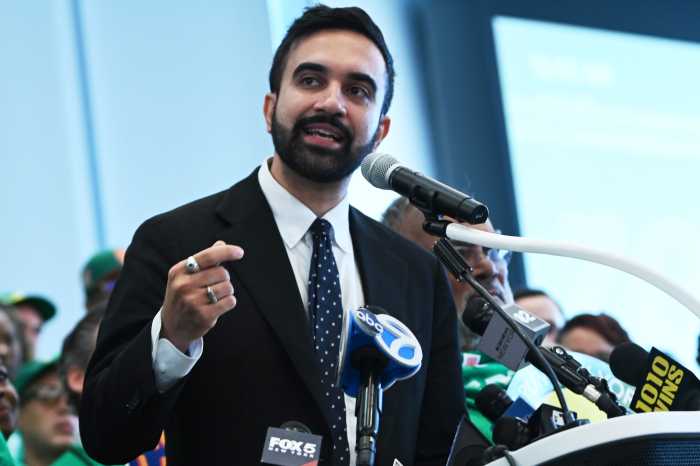Molaskey’s jokes, Hawke’s hangover, Alcott’s secret diva, loser of the week
“When The New York Times likes something, they really like it,” observed J.D. Biersdorfer, the Gray Lady’s ace computer reporter, who writes the indispensable Q&A column in the Circuits section. Biersdorfer, whose new book “iPod & iTunes: the Missing Manual,” answering all of your music needs, was referring to Stephen Holden’s laudatory review of Jessica Molaskey in the Algonquin’s Oak Room.
And, sure enough, on January 25 the house was packed for the singer, as it had been all weekend, despite that 15-inch snowfall.
“This is my real New York cabaret debut,” said Molaskey. “I’m more used to the theater where you work so hard on something and the critical reaction is nothing. I was completely surprised by that rave.”
No wonder: Holden’s review referred to her supposedly darker, more cynical interpretations of standards like “Make Believe” and “When the Red Red Robin.” I found them to be nothing of the kind: Molaskey sung them straight and simply, letting the lyrics do all the work and imbuing these standards with a loving care and sincerity which made them glow. This critical incongruity reminded me of what Barbara Cook confessed to me about the last review she received from Holden: “It was too analytical, more of a dissertation than a review.”
Backed by a crack crew—Larry Goldings, playing an exquisite melodica, Martin Pizzarelli on bass and her husband, John Pizzarelli, doing his guitar magic, Molaskey had a loose, jazzy onstage charm.
“Speaking of Sponge Bob supposedly being gay,” she said, “in my experience, I find it very rare that anyone can be gay and square at the same time. My husband’s gay. I said that. Out loud. In front of people. At the Algonquin.” This caused some major raised eyebrows from said hubby over his fretwork.
Although Molaskey joked about her husband sleeping with her to get the gig, she is actually the soul of modesty: “My backup consists of some very fancy guys, who work with James Taylor, etcetera. I could never afford them myself. As for the crowds who came out to see me in the snow, maybe it was because they were just trapped in the neighborhood.” I asked about her father-in-law, genius guitarist, Bucky Pizzarelli: “He’s doing just great at 79. He’s just back from Istanbul and is coming to see me tomorrow. I hope he’ll sit in with us some time.”
Molaskey sang an endearing version of Irving Berlin’s “Oh How I Hate to Get Up in the Morning,” but said her original record label had rejected this, saying, “’Oh, Berlin. He’s like Sondheim, clown songs, right? What’s up with him? That’s like saying, ‘Oh, that Mozart, what’s up with him?’ So I changed record companies, but on the day my CD ‘Pentimento’ came, out my producer was convicted of embezzling $17 million!”
This reference to John Jerome, who also produced for the likes of Karen Mason, Phillip Officer and Jeff Harnar, elicited major reaction from the crowd.
With an Oscar nomination for the screenplay for “Before Sunset” and the opening of his film “Assault on Precinct 13,” the weekend found Ethan Hawke a total wreck, flopped onto a flea-bitten couch, completely hung over, with his butt hanging out of a pair of soiled boxer shorts. He roused himself, walked into the bathroom and, leaving the door open, took the longest piss imaginable.
Relax, it was all for The New Group’s revival of David Rabe’s play, “Hurlyburly,” seen on January 22, an exhaustive three-hour treatise of ‘80s druggies and their total lack of cordiality toward one another. I remember walking out of the 1998 Sean Penn film adaptation of the play, which was probably salaciously shocking when it debuted onstage in 1984, directed by Mike Nichols, with Sigourney Weaver, William Hurt and Harvey Keitel. (You couldn’t even kill for a ticket back then).
The bad news is the play is just as long, long-winded and aimless as ever. The relative merits of the restaurants Mr. Chow and Ma Maison are chichi-ly discussed ad nauseum in a passage critics have been hailing as “brilliantly comic.” The good news is that the usually inert Hawke and overwrought Parker Posey, absolutely ravishing in Halston-esque disco mufti designed by Jeff Mahshie, have finally found themselves histrionically onstage. “I hate my ex-wife! I hate my ex-wife!” Hawke says at one point, and, boy, did he deliver that line.
Added eye candy is provided by Halley Wegryn Gross, dippily amusing as an eminently lay-able waif, and Bobby Cannavale, the sexiest man in America, who invests his creepy character with savage charm as well as major package in skivvies.
Why, with any revival of “Little Women,” is the emphasis always on the character of tomboy-ish, dare we say dyke-y, writer, Jo? Anyone knows that the real heroine of the book is Amy, selfish, vain, artistic, and ultimately lucky, lucky Amy. By far the most interesting of those immortal March sisters, she’s human and flawed and so much more interesting than bovine breeder Meg, saintly (yawn) Beth and even Jo, author Louisa May Alcott’s alter ego.
Gay men and girly-girls all know this for a fact, especially if your impressions were formed by any childhood viewing of the 1949 MGM film version. Overproduced and treacly, yes, but as Amy, Elizabeth Taylor gave her truest performance, radiantly gorgeous in golden curls and unashamedly gluttonous over the Christmas treats she was forced to share with the poor by that tiresome do-gooding Marmee of hers.
In the new Broadway musical version, in this role, Amy McAlexander steals the show from her very first entrance, like some diminutive hoop-skirted imp, with a clothespin on her nose to force it into classical proportions. McAlexander enlivens the stage whenever she appears. When she viciously burns Jo’s manuscript, her acting has a demonic quality at once very true and very childlike, and when she returns triumphantly from Europe with couture and Jo’s erstwhile suitor, Laurie (a winning Danny Gurwin), in hand, her sudden transition to womanhood is far more convincing than Foster Sutton’s in the role of Jo.
Alan Knee‘s book is a nervy affront to Alcott’s novel, full of unnecessary interpolations (Jo’s scribbled characters become real onstage—yecch), omissions (Beth’s fatal entrance) and flashback plotting “enhancements.” Knee also wrote the screenplay “Finding Neverland,” which bored me blind, with its “Terms of Endearment” soapiness and Johnny Depp, facilely channeling his inner child instead of the complex, sexually ambivalent character J.M. Barrie was in life.
Randoms: The fact that opera singers Susan Graham and Denyce performed at the Inauguration for our First Idiot and his pie-faced, couture-clad harem (talk about sows’ ears!) facetiously begs the question: Are all mezzo-sopranos evil?
Loser of the Week goes to this guy I overheard saying, “I’m so glad I didn’t go to Phuket this year. I made plans for Bangkok, which will be really hot now that the boys from Phuket will probably all be going there.” Some nasty queens can find a silver lining anywhere.
The Nepotism Prize has got to be awarded to Sir Peter Hall, who gets his kids all the good jobs. His son, Edward, has some talent as a director, as evidenced in “A Midsummer Night’s Dream” at BA), but I wonder about his daughter, Rebecca, who starred as Rosalind in his production of “As You Like It,” seen on January 27, which just wrapped, also at BAM. She got raves, but I found her acting to be much too cerebral and affected, with an often indistinct, “plummy” voice and a distanced approach to this ebullient part—in which Elisabeth Bergner and Vanessa Redgrave once shone—which did not engage.
And, with all the brouhaha over Prince Harry wearing Nazi drag to a birthday party, why didn’t anyone address the vileness of the party itself, which had as its theme “Colonial and Native?” In Wiltshire, England, political correctness evidently is as nothing compared to extant dreams of Empire. And doesn’t Madonna live there?
Contact David Noh at Inthenoh@aol.com
gaycitynews.com




































